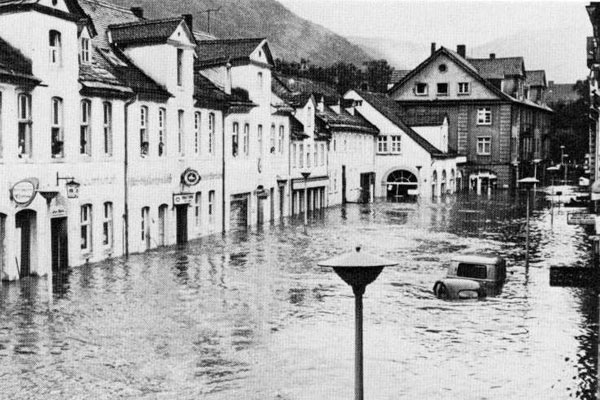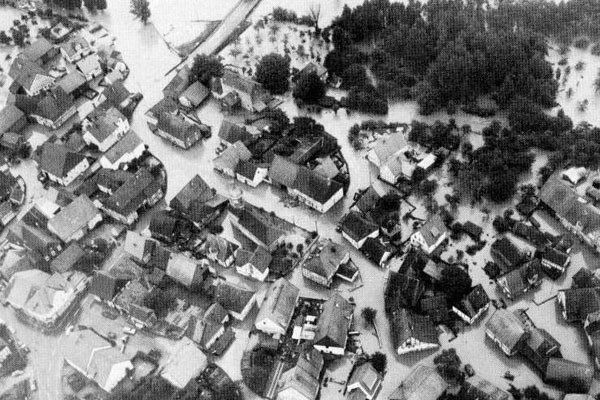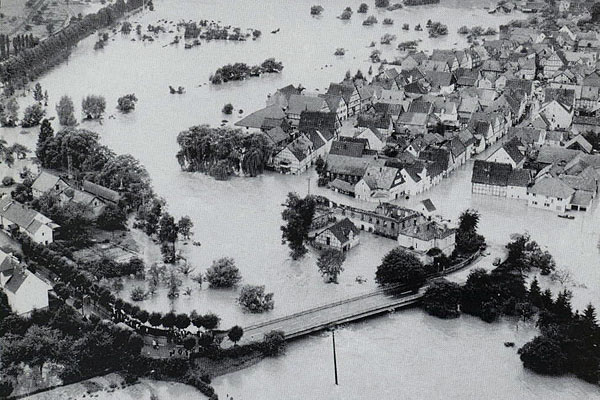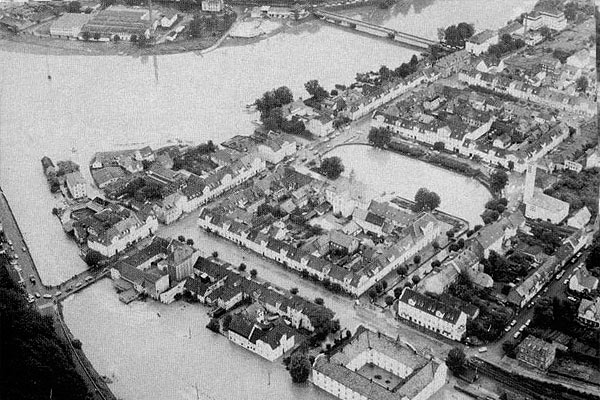Online weather site www.wetter24.de here today writes about the devastating Heinrichflut (Heinrich Flood) of 1965, back when CO2 was only 320 ppm, well below the often claimed “safe” level of 350 ppm that some alarmists like to have us think would bring us much less extreme weather.
Worst flood in the region’s collective memory
In 1965 the spring and early summer had been cool and wet. In the early afternoon on Friday July 16, 1965, in the central German region between Paderborn, Kassel and Gottingen, the skies darkened quickly and torrential rains fell. Within a matter of hours large areas became submerged under water. Rivers and streams swelled and swept houses, livestock and property away. 16 people were killed. It was the worst flood in the region’s centuries-long collective memory. Had the storm hit during the night, the loss of life would have been far worse, experts say.
The following aerial photos were taken the next day and show the aftermath of the July 16 flood:
Bad Karlshafen. Source: here.
Eberschutz. Source: here.
Imarshausen. Source: here.
Karlshafen. Source: here.
Cold air trough formed between two air masses
What caused the freak weather of 1965?
According to Wikipedia in mid July 1965 a mass of warm air flowed northwards from the subtropics and collided with cold Arctic air flowing down from Scandinavia. On the backside of the warm air mass over northern France a so-called cold air trough formed and led to the warm becoming completely surrounded by the cold air. The warm air lifted above the cold air mass, leading to severe thunderstorms and torrential precipitation. The region’s hilly terrain and river valleys served to exacerbate the situation.
200 mm in 24 hours
In an area between Paderborn and Kassel and Fritzlar precipitation amounts of 100 mm fell in just 2 hours. In other areas between July 14 and July 17 up to 200 mm of rain fell in 72 hours. In Dalheim alone over 200 mm fell in 24 hours.
What does all this mean? It means that freak weather events are also common in times of low atmospheric CO2 concentrations and “global cooling”. It all gets down to weather and not climate. Weather catastrophes are not going to be prevented by practicing “green” rituals and CO2 voodoo.
Despite alarmist claims that weather extremes are becoming more frequent, objective observers see no trend change in extreme weather events in Germany or world wide.
Sources:
https://de.wikipedia.org/wiki/Heinrichsflut
http://www.wasserverband-diemel.de/historisch.php
https://www.youtube.com/watch?v=8b9Y8YyOd1E









Very interesting, never heard of it. What’s wrong with Wetter24? Can’t they just stay on message? CO2 causes everything bad! Without CO2, everything’s awesome!
Yes, floods have always happened — who knew? In the Pacific Northwest, the Missoula Floods sent ~1500 cubic kilometers of water rushing down the Columbia River gorge, at up to 60 km3/hr, several dozen times as the last glacial period was ending.
All before the anthropocene!
But now, in the Antropozene, everything’s different. Because it’s the Antropozene! And it started with Ike!
Everything was still fine under FDR!
Ahhh! another made up meaningless term.
just like the 2C meme,
just like the hockey stick,
just like the whole anti-CO2 scam.
The Missoula flood wasn’t due to heavy precip at the time, it was from the failure of the ice dam that formed Lake Missoula.
I spent a couple days in Missoula on a bicycle tour in 1974 and noticed some of the hills around town had trees on one face and grass on another. A few months after I got home, the cover of Science News had a photo of the hill I climbed. The related article described how the erosion patterns were similar to a region on Mars. At the time it was the best evidence that there had been surface water there.
More like the credulacene.
Does this make me a climate refugee? We left the (Lippe-)Detmold region in early 1968 for Australia.
Where it was supposed to be warm and dry. 😉